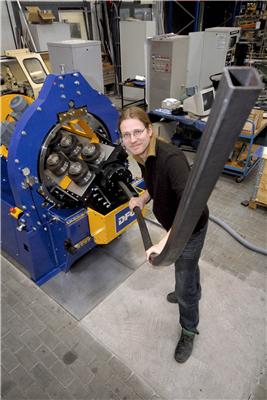Apr 20 2009
The new development of Technische Universität Dortmund, for which an international patent has already been filed, solves problems arising in connection with three-dimensional bending of profiles with complex cross-sections.
 Project supervisor Dipl.-Ing. Matthias Hermes at the new shape bending machine which he developed within the scope of his dissertation at the Institute of Forming Technology and Lightweight Construction.
Project supervisor Dipl.-Ing. Matthias Hermes at the new shape bending machine which he developed within the scope of his dissertation at the Institute of Forming Technology and Lightweight Construction.
Due to their complex cross-sections, profiles are often harder to process than pipes. For instance, profile cross-sections are harder to guide than the circular cross-section of a pipe. Furthermore, bending results are hard to predict. In the innovative bending machine six rolls provide the feed drive. Therefore, the machine is very suitable for processing extremely long semi-finished products. A linear deflection device is located in front of the feed drive, which induces the lateral force for the bending process. The roll-system is pivoted and can be rotated around the longitudinal axis of the workpiece. This technique allows a torsional moment to be superposed with the bending process. This changes the bending plane and allows three-dimensional profile bending. Moreover, the process and the machine allow the difficult processing of profiles with asymmetrical cross-sections.
The shape bending machine could be used in automobile manufacturing as a partial replacement for stretch bending or be applied in aircraft construction, in furniture industry and in architecture.